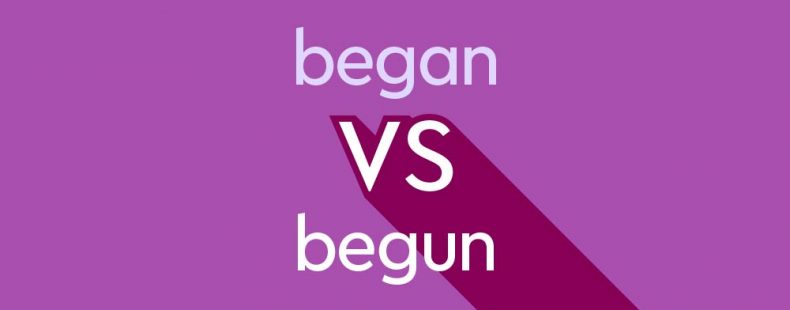⚡ Quick summary
Begin is an irregular verb. Begin is the base form, which can be used in the present tense and the future tense (will begin) and as an infinitive (to begin). Began is the past tense form, as in The party began this morning. Begun is the past participle form, which is used to form the present perfect tense (has/have begun) and the past perfect tense (had begun) and is used in passive voice constructions (as in The novel was begun by the author but finished by his daughter).
Do you know why the past tense of begin is began and the past participle is begun? If not, you can begin to understand by reading on.
In this article, we will explain how and when to correctly use begin, began, and begun, explain why begin is considered an irregular verb, identify some verbs similar to begin, and provide examples of how we use begin, began, and begun in sentences.
began vs. begun
The verb begin is an irregular verb. Begin is the base form of the verb, which can be used in the present tense and future tense (will begin) and as an infinitive (to begin).
For example:
- The animal shows begin with dancing bears.
- The parade will begin outside the fire station.
- Jean waited for the movie to begin.
A verb is typically considered to be irregular if its past tense or past participle is formed without using the standard –ed or –d endings used in regular verbs (walked, saved). This is the case with begin. Instead of begined, the past tense is began.
For example:
- Last night’s celebration began with fireworks.
- Before I began my painting, I had sketched out what I wanted to paint.
And the past participle form of begin is begun. Past participles are preceded by the auxiliary verbs have, has, and had to form the perfect verb tenses. The verb phrase has begun is used with a third-person singular subject (except with singular they). The phrase have begun is used with any other subject, including first-person singular and plural, second-person singular and plural, and third-person plural.
For example:
- The movie has already begun, and we haven’t bought popcorn yet.
- When the trumpets start blaring, it means the games have begun.
Like all other past participles, begun is also the form that’s used in the passive voice. When used this way, it’s used with the various forms of the helping verb be.
For example:
- The chorus of loud meowing was begun by a fat, shaggy cat.
- The imperial traditions were begun by Emperor Augustus.
Verbs similar to begin
No other verb follows the exact conjugation pattern of begin. Most other verbs ending in –in, such as thin, skin, and sin, are regular verbs. The closest irregular verb to begin is the verb spin, which changes spelling to spun in the past and past participle forms.
However, several other irregular verbs follow a similar spelling change pattern to begin, in which an i changes to an a in the past tense and to a u when used as a past participle:
| present tense | past tense | past participle |
| begin | began | begun |
| ring | rang | rung |
| sing | sang | sung |
| spring | sprang | sprung |
| sink | sank | sunk |
| stink | stank | stunk |
| drink | drank | drunk |
| swim | swam | swum |
Examples of begin, began, and begun used in a sentence
We have only just begun to learn about the word begin, so let’s look at some example sentences that show how we typically use begin, began, and begun.
- The work will need to begin before sunrise if we want to finish in one day.
- The mayor always begins the ceremony with a long speech.
- Boomer began to wag his tail when he saw his favorite dog treats.
- The decrepit bridge had already begun to collapse even before the workers started tearing it down.
- Sarah had begun to learn French before she started high school, I began to learn French in college, and Troy will begin to learn French once he finishes his Spanish lessons.














